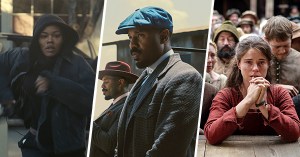Charlton Heston’s Most Memorable Performances
RT looks at the iconic roles of a Hollywood legend.
With his classically chiseled looks and basso profundo speaking voice, Charlton Heston was an icon of old-school Hollywood. Heston embodied a noble, heroic ideal — small wonder he was the man who injected a sense of gravitas, as well as intelligence and fallibility, to big, bold Biblical epics and historical dramas. And if the kind of grandiosity Heston brought to every role — even Wayne’s World 2! — might seem old-fashioned in these ironic times, there’s still something thrilling in seeing an actor of such rugged intensity giving every role his all. In remembrance of Heston, Rotten Tomatoes has compiled a short list of some of Heston’s most famous and memorable performances.
The Ten Commandments (1956, 96 percent)
With the influx of foreign, arthouse, and indie films in the mid-1950s film market — not to mention the looming threat of television — Hollywood’s answer to attracting audiences involved grand spectacle. Even given the life expectancy of bodies during biblical times, the 34-year-old Heston was strikingly young to play Moses, the legendary leader of the Jews. Yet no other could have outdone his booming voice and security inspiring authority. This is one of the more “pure” of the Biblical epics of the late 1950s early 1960s, for while there’s plenty of political commentary to be found within its dialogue and carefully located intimacies, its greatest strength is its ability to inspire the awe famously associated with Biblical tale. Heston’s Moses certainly contributes. For those less familiar with Cecille DeMille‘s last directing project, The Ten Commandments is one of those films that’s ironically had a longer life due to endless televised repetition.
One of the last of the classic film noirs, Orson Welles‘ Certified Fresh Touch of Evil featured one of Heston’s most driven performances. Heston plays Vargas, a newlywed Mexican g-man who investigates a bombing in a U.S. boarder town; he quickly runs up against the corrupt lawman Hank Quinlan (Welles), who appears to be railroading several Mexicans for the crime. Noirs don’t come much more noir than Touch of Evil, a stark, sinister, gritty, formally daring masterpiece. Though Touch of Evil had a troubled history — the film was taken out of Welles’ hands and recut — it was a favorite of Heston’s. “It was a remarkable experience for me, a great learning experience, one of the most valuable I’ve had in my whole film career,” he said.
The downside (or upshot, depending) to the Studio Era was the Production Code, which required that certain subject matter not be broached in studio productions, no matter the relevance or box office draw. One such subject was violence, which is peppered (liberally for 1959) into Ben Hur. This tale of politics and racial tension during Christ’s ministerial rise features sword fighting, swashbuckling, and one of the most famously overplayed sequences in film: The epic chariot race, in which cinematographer Robert Surtees lit Heston in this scene to look like Apollo himself in the Coliseum. Violence notwithstanding, the most controversial elements of the film were the contributions made by notorious (and uncredited) screenwriter Gore Vidal. Suggestions of sexuality (distinct from today’s more common mores), the blacklist (of which Vidal was critical) and backhanded politics were intelligently apportioned but in heed of the Production Code, buried in subtext. Loaded with legendary dialogue (“The world is more than we know”), this multiple Oscar winner is another springtime repeat that’s impressive regardless of how you spend your Easter Sunday.
In the late 1960s and early 1970s, Heston starred in a series of dystopian sci-fi flicks (The Omega Man, 61 percent, and Soylent Green, 73 percent) with more heft than your average futuristic fantasy. Time has taken some of the edge off these films (Phil Hartman unforgettably lampooned the later, portentously intoning, “Soylent Green is made out of PEEEE-POOOLLLLEEE!”), but the Certified Fresh civil-rights allegory Planet of the Apes remains influential — and was elevated by Heston’s intense performance. Heston plays an astronaut who lands on a planet run by sophisticated simians that have enslaved humans. The movie has one of the most iconic endings of 1960s cinema, as well as Heston’s oft-quoted line, “Take your stinking paws off me, you damned dirty ape!”






